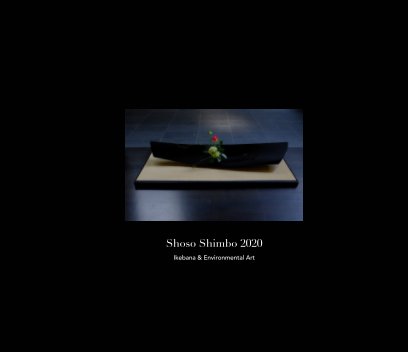International Society of Ikebana Studies, Regular Conference, September 2019
Shoso Shimbo, PhD will talk about the rise of free style ikebana in 1920's as part of Wa: Melbourne Ikebana Festival.
When: 9 am, 1 September 2019
Where: Rosina Auditorium, Abbotsford Convent, Melbourne
Booking: https://www.trybooking.com/book/event?eid=534663&
Influence of the Western Modernism on Perception of Nature in Ikebana: A New Interpretation of Ikenobo Senno Kuden (1542) and Its Hidden Link to the Rise of Free Style in the Modern Japan
Western culture, in particular the Modernism Art Movement, has had an influence on Ikebana since the Meiji period (1868 - 1912). As such, Ikebana has undergone a cultural transformation that is closely related to a redefinition of Ikebana, incorporating a reconsideration of the attitude to nature in Japan. This study focuses on works by Suido Yamane (1893 - 1966), Mirei Shigemori (1896 -1975) and Hiroshi Teshigahara (1927 - 2001) who were particularly conscious of the influence of Western culture on Ikebana.
My talk today is a small part of my research on influence of the Western culture on Ikebana, and it focuses on Suido Yamane who proposed free style arrangements in the 1920’s for the first time in the history of Ikebana. I would like to focus on the relationship between Ikenobo Senno Kuden in the 16th century and emergence of free style Ikebana in the 1920’s.
There is an argument that, in modern Japan under the influence of Western culture, there was a shift in the view of what Ikebana symbolically represents – from universal structural orders to life energy. However, these external and internal approaches were both mentioned in the classic Ikebana text, Ikenobo Senno Kuden (1542). This concept of Ikebana as a representation of life energy did not begin with the reformers in 1920’s & 1930’s, it has been around since the early stage of development in Ikebana and deserves more attention.
This study suggests that with encountering Western culture, Ikebana artists and theorists became aware of the differences in the perception of nature in the West and in Japan. In their effort to incorporate Western attitudes to nature into Ikebana, they needed to reconsider the essence of Ikebana, and develop new theories on Ikebana. This study also suggests that those new theories are often based on Eastern philosophy.
http://www.shoso.com.au
https://www.facebook.com/ikebanaaustralia
Influence of the Western Modernism on Perception of Nature in Ikebana: A New Interpretation of Ikenobo Senno Kuden (1542) and Its Hidden Link to the Rise of Free Style in the Modern Japan
Western culture, in particular the Modernism Art Movement, has had an influence on Ikebana since the Meiji period (1868 - 1912). As such, Ikebana has undergone a cultural transformation that is closely related to a redefinition of Ikebana, incorporating a reconsideration of the attitude to nature in Japan. This study focuses on works by Suido Yamane (1893 - 1966), Mirei Shigemori (1896 -1975) and Hiroshi Teshigahara (1927 - 2001) who were particularly conscious of the influence of Western culture on Ikebana.
My talk today is a small part of my research on influence of the Western culture on Ikebana, and it focuses on Suido Yamane who proposed free style arrangements in the 1920’s for the first time in the history of Ikebana. I would like to focus on the relationship between Ikenobo Senno Kuden in the 16th century and emergence of free style Ikebana in the 1920’s.
There is an argument that, in modern Japan under the influence of Western culture, there was a shift in the view of what Ikebana symbolically represents – from universal structural orders to life energy. However, these external and internal approaches were both mentioned in the classic Ikebana text, Ikenobo Senno Kuden (1542). This concept of Ikebana as a representation of life energy did not begin with the reformers in 1920’s & 1930’s, it has been around since the early stage of development in Ikebana and deserves more attention.
This study suggests that with encountering Western culture, Ikebana artists and theorists became aware of the differences in the perception of nature in the West and in Japan. In their effort to incorporate Western attitudes to nature into Ikebana, they needed to reconsider the essence of Ikebana, and develop new theories on Ikebana. This study also suggests that those new theories are often based on Eastern philosophy.
http://www.shoso.com.au
https://www.facebook.com/ikebanaaustralia
























